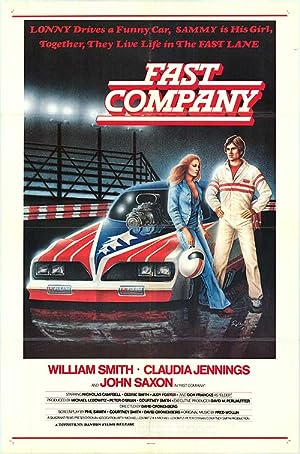If I like a director, I’ll see all his or her movies. Even if the specific movie does not sound like something that I would usually be interested in. Fast Company, a movie about the personal and professional conflicts of drag car and funny car racing, only ended up in my queue because David Cronenberg directed it. I’ve seen documentaries about parking lots and loved it so it is not outside of the realm of possibility that I could enjoy this movie. Unlike me, my parents adore sports, and I am not entirely sure if they ever watched a NASCAR race in their life though it is possible. I don’t even know if NASCAR is even in the same racing sphere as drag or funny car racing. I barely know the difference between the later. So what did I think?
I thought, “What the hell is going on?” Cronenberg is Canadian, but he tried to pretend that it was set in the US by starting with iconic shots of the open road and the American flag. The patriotic drag was so unexpected and jarring to see from the generally unconventional Canadian director that I almost metaphorically collapsed. Seriously I had no idea what I was watching, decided to go to Wikipedia to get my bearings on the basics then resumed watching the movie, and without the spoilers, I probably would have been dumbfounded the whole ninety-one minutes.
While watching Fast Company, early in the movie, it was hard to distinguish which characters were going to play a pivotal role and which only served a utilitarian purpose, which is probably why I was also initially confused. The protagonist is Lonnie, and he just wants to be the best racer that he can be, but the antagonist, his boss, only wants him to be good enough to market the titular’s company’s crappy products without costing him a lot of money.
The boss is a magnificent bastard and just lives to ruin everyone’s lives. John Saxon does a great job being utterly vile and petty. He plays people off of each other who have no existing rivalries, inflames insecurities, has other people fight his battles (yes, he has actual henchmen who apparently are unbothered about being charged with violent crime), sexually harasses employees and flaunts his financial perks and power in the hoi polloi’s faces. He wants to be the biggest guy in the room so he tears others down even if they aren’t rivals just because he doesn’t want anyone to feel too good. Fast Company may be set on the road, but Saxon acts as if he is fighting for world dominance in slick boardrooms in glass skyscrapers. He is small potatoes acting big time, and he is the best part of the movie.
Lonnie is everything that his boss is not: an earnest, successful, strong, square-jawed hero, generous with the spotlight, nonjudgmental and encouraging. He also displays American characteristics that are only rewarded in movies: a lack of reverence for power, an unwillingness to sacrifice principles for a payday and fearlessness in the face of danger and physical harm. In the real world, he would be called reckless and insubordinate.
The protagonist and antagonist represent the extreme opposite ends of the spectrums in terms of physical prowess and psychological health while the other characters fall somewhere in between. In many ways, Fast Company is not just a race on the road, but a fight for the souls of everyone who works on the road to not just sell one’s integrity to the highest bidder in exchange for cheap, temporal pleasures that can go up in flames in an instant. It is about the innate pleasure of doing good work, not satisfying a hunger for the perks that come with that work.
Fast Company as a movie about conflict, resolution and toxic personalities is an instructional movie on how to navigate office politics in any setting, but as a market movie, automotive Western as Mark Irwin, the Director of Photography, suggests that it is, I discovered that I am not a fan of this odd genre. I’m going to put my prude hat on, but there are multiple scenes where a couple is having sex then someone casually comes in to talk or another couple kicks out a couple so they can have sex then don’t even change the sheets. I’m hoping that even the cheapest motel does that at least. The music is so extra and in the forefront that it was completely off putting. The acting is generally dreadful. Call me a snob, but I would not hang out with any of these folks, and I stand for the security guards and cleaners in any building downtown. Even the nice guys are savages in this movie. Where are the police?
I do not love Cronenberg unconditionally because I am not a fan of Fast Company. If my life depended on it, and I had to guess which famous director directed this film, I would not have been able to guess that it was Cronenberg in a million years. I would have incorrectly guessed Paul Verhoeven. I could not discern any of Cronenberg’s signature touches or storylines except maybe the intersection of car crashes and sex from Crash. I prefer Cronenberg when he is focused on body horror or psychologically disturbing subjects, but Cronenberg’s version of a mainstream movie was not appealing to me on any level other than the theoretical. Unless you’re a fan of various styles of car racing or late 70s cult movies, skip it.
Stay In The Know
Join my mailing list to get updates about recent reviews, upcoming speaking engagements, and film news.





